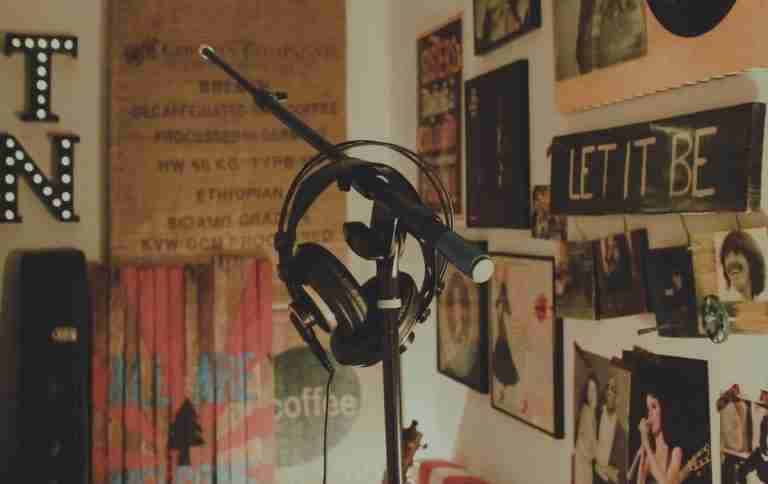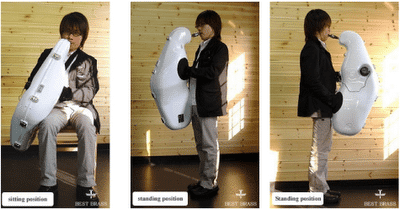Here’s something that I don’t tell many people…I’ve practiced my instrument huddled inside a closet, surrounded by dirty laundry. I’ve worked out scales after dark sitting in the back seat of my car. I’ve practiced classical etudes in secluded corners of Central Park and I’ve played into pillows after midnight to run through tunes. Looking back I’ve practiced in some pretty weird places. Not exactly ideal for sound quality or comfort, but it often came down to a simple choice: practice or don’t practice.
If you’re serious about music, you’ve probably encountered this exact situation. You truly want to get some practicing done, yet despite your best efforts you don’t have anywhere to do it.
You might be traveling, working late, staying at a friend’s house, or living in an apartment building where the neighbors have a strict quiet policy. Or you might just find yourself in a place where you don’t want to bother anyone.
You’ll encounter many obstacles on your journey to perfecting your craft, but there is one simple, yet important factor that can affect your playing in a big way: your practice environment.
All practicing is not created equal
Just because you’ve found an empty room and you have your instrument doesn’t mean that you’ve stumbled upon the perfect practice situation.
There are some key factors that go into creating a productive practice space.
While most people think about practice in terms of content (scales, etudes, technical exercises, tunes, etc.), it’s equally important to consider the quality of your practice time – specifically, the physical location and the mental state you’re in as you practice.
Remember, quality prevails over quantity when it comes to improving in the practice room. You could spend hours in a distracting or stressful environment and accomplish as much as you would spending 20 minutes in a place where you have total concentration.
“Concentration is born on the practice court…you must mentally treat your practice sessions as matches, concentrating on every ball you hit.”~Martina Navratilova
This is exactly why your practice environment is so important.
While you can get some practicing done anywhere, even away from your instrument, there is no substitute for some quality time spent alone with your instrument.
Each day that you practice, you need to find the ideal environment, both mentally and physically. Here are three factors to consider when selecting your practice location.
I) Avoid mental and social distractions
Have you ever noticed that you don’t practice as well when you know that someone is listening to you?
You’re not going crazy.
The truth is other people can affect your practice in a big way. Aside from the obvious social distraction caused by people in your practice area, the bigger distraction comes in a feeling of self-consciousness when you know that other people can hear you.
Psychologists have termed this feeling “evaluation apprehension.” If you’ve ever had to speak in public or perform in a competition, you know this anxious feeling all too well.
While the social aspect of any activity can improve performance (e.g. competition and drive to succeed), it can also have a negative effect that can detract from your performance. The presence of others leads to the idea social rewards or punishment and this affects your ability to concentrate and perform.
“The next thing is quite important, about priorities-how to organize your time with no distractions. The ideal scene: no one can hear you, not your mother, not your brother, not your friend, not your lady—nobody should hear you practicing. You can say “I don’t care” but the vibe is in the air and it affects you. If you can’t be alone do the best you can. This is your time, it’s a meditation. It’s work, it’s real work which means a lot of mental calories and it has to be done without distraction.”
~Dave Liebman
When you are conscious that someone is listening to you as you practice, you’re going to be affected whether you like it or not. Think about it, you’re concentration isn’t going to be great when your neighbors are banging on the walls during your practice session. Even the simple awareness that someone is listening can alter your focus, regardless if it’s positive or negative feedback.
To get the most out of your practice time, strive to find a practice environment where you won’t be interrupted by others and ideally, where no one can hear you.
II) The fear of sounding bad
As a performer, one thing that you don’t want to do is to sound bad in front of other people…especially your peers.
When we know that someone is listening, especially other musicians, we gravitate toward the things we sound good on and avoid those that need the most work.
Studies have shown that the performance of easy, well learned tasks improves in the presence of others, however the performance of difficult or unfamiliar tasks goes down, and guess what you’re doing when you’re practicing?
That’s right…working on new material that is difficult and unfamiliar.
“I also just hate practicing in hotel rooms…I wouldn’t really enjoy being next to a practicing saxophone player in a hotel and I don’t want everyone to hear what I’m doing.”~Chris Potter (from Being Here)
As a result we often play the things we know well when we are around our peers. I’ve especially noticed this phenomenon in music school practice rooms. As I was surrounded by other practicing musicians in school, I would play lines or tunes or exercises that I sounded good on rather than practicing the things that I needed the most work because other musicians might hear me making mistakes.
The trouble with this environment is that you never actually practice, you just review the things that you already can play well. Remember, your practice time should be the time when you take the things you sound bad on and work them out slowly until you master them.
Face it, you’re going to sound bad when you’re truly practicing and focusing on your weaknesses, there’s no way around it. Ultimately you need to find an environment where it’s OK to sound bad.
Like anything else in life you don’t want to look unfavorable in front of your social or peer group and the same is true for music. If your mind isn’t at ease, your practice won’t be productive — you play softer, you hold back, and you don’t attempt difficult areas or take chances.
As Dave Liebman says, practice is meditation. You need to find a location where you can devote 100% of your concentration to the task at hand without the fear of sounding bad in front of others.
III) Physical obstacles
Practicing an instrument creates sound and sometimes this isn’t ideal depending on your living situation.
But the show must go on and as musicians we’ll take the necessary measures to ensure that we get some practice in. We use mutes to dampen our sound, we play outdoors and battle the elements, we practice on modified or substitute instruments, and we change the way we play to create less sound.
It’s fine to adjust/mute your instrument or to play on a substitute instrument for a few nights of practice, but if this is a long-term solution, it’s going to have an effect on your playing.
It’s important to keep in mind that consistent practice creates habits. The more you alter the way you play in your practice sessions the more it will affect your performance.
Mutes, dampers, and substitute instruments (like keyboards or drum pads/electronic kits) will affect your pitch, your technique, and the way you produce sound on your instrument.
If you’re not practicing on the same set up or instrument that you perform with, you could run into some problems.
Do your best to practice each day on the same set up that you perform on…unless of course you like playing into your saxophone case like that guy.
Different practice for different reasons
Some days you just need to warm-up or run through your technical exercises and scales and others days you need to tackle one thing to really focus on it.
Each day is different. If you’re just warming up or brushing up on technique you don’t need the perfect practice environment, however if you’re learning a tune off of the record or are transcribing lines you need a place where you can really concentrate.
Think about your current practice environment for a moment.
Are you in a place where you can focus without mental distraction and be productive? Are you in a place where you can play freely without the worry of disturbing someone? Or are you sacrificing sound and focus just to be able to play your instrument?
The truth is you’re not always going to get your ideal practice situation. Sometimes you have to make due with what’s available. This might mean using a mute, going out into the park, playing softly, working on other aspects of your musicianship, or even just spending time on focused listening.
However for your consistent practice sessions you should strive to find a place where you can play freely and concentrate. Find a place where you are free from social distraction, where it’s OK to sound bad, and where you can play your instrument in a natural way at any volume you choose.
Locating or creating this practice environment may take some time and effort, but the increase in your day to day practice quality and overall musical improvement will be well worth it.














